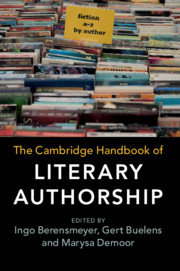Book contents
- The Cambridge Handbook of Literary Authorship
- The Cambridge Handbook of Literary Authorship
- Copyright page
- Contents
- Figures
- Contributors
- Acknowledgments
- Abbreviations
- Chapter 1 Introduction
- Part I Historical Perspectives
- Chapter 2 Authorship in Cuneiform Literature
- Chapter 3 Authorship in Ancient Egypt
- Chapter 4 Authorship in Archaic and Classical Greece
- Chapter 5 Authorship in Classical Rome
- Chapter 6 Conceptions of Authorship in Early Jewish Cultures
- Chapter 7 Modes of Authorship and the Making of Medieval English Literature
- Chapter 8 Manuscript and Print Cultures 1500–1700
- Chapter 9 The Eighteenth Century
- Chapter 10 The Nineteenth Century
- Chapter 11 Industrialized Print
- Chapter 12 Postmodernist Authorship
- Chapter 13 Chinese Authorship
- Chapter 14 Literary Authorship in the Digital Age
- Part II Systematic Perspectives
- Part III Practical Perspectives
- Select Bibliography
- Index
Chapter 4 - Authorship in Archaic and Classical Greece
from Part I - Historical Perspectives
Published online by Cambridge University Press: 07 June 2019
- The Cambridge Handbook of Literary Authorship
- The Cambridge Handbook of Literary Authorship
- Copyright page
- Contents
- Figures
- Contributors
- Acknowledgments
- Abbreviations
- Chapter 1 Introduction
- Part I Historical Perspectives
- Chapter 2 Authorship in Cuneiform Literature
- Chapter 3 Authorship in Ancient Egypt
- Chapter 4 Authorship in Archaic and Classical Greece
- Chapter 5 Authorship in Classical Rome
- Chapter 6 Conceptions of Authorship in Early Jewish Cultures
- Chapter 7 Modes of Authorship and the Making of Medieval English Literature
- Chapter 8 Manuscript and Print Cultures 1500–1700
- Chapter 9 The Eighteenth Century
- Chapter 10 The Nineteenth Century
- Chapter 11 Industrialized Print
- Chapter 12 Postmodernist Authorship
- Chapter 13 Chinese Authorship
- Chapter 14 Literary Authorship in the Digital Age
- Part II Systematic Perspectives
- Part III Practical Perspectives
- Select Bibliography
- Index
Summary
Defining “literature” or “literary authorship” in the context of ancient Greece is not simple. Classical Greek has no equivalent word. Mousikë, the field of the Muses’ activity, includes music and dance, and may exclude texts that Greeks treated in ways that moderns would consider literary. The closest is probably paideia, “education” or “culture,” although it is broader than our “literature.” Greeks themselves did not agree about boundaries. Aristotle’s Poetics excludes philosophy composed in verse from poetry,1 but if we think of literature as texts or performances that seek to provide aesthetic pleasure and are evaluated for verbal artistry, the range of Greek literature was very wide. In general, Greeks would have regarded as open to aesthetic judgment any text that was not purely technical.
- Type
- Chapter
- Information
- The Cambridge Handbook of Literary Authorship , pp. 46 - 63Publisher: Cambridge University PressPrint publication year: 2019

